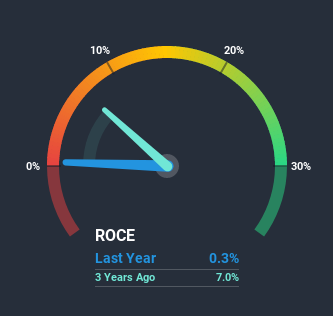
If we're looking to avoid a business that is in decline, what are the trends that can warn us ahead of time? More often than not, we'll see a declining return on capital employed (ROCE) and a declining amount of capital employed. Ultimately this means that the company is earning less per dollar invested and on top of that, it's shrinking its base of capital employed. So after glancing at the trends within Arteria (WSE:ARR), we weren't too hopeful.
Understanding Return On Capital Employed (ROCE)
For those who don't know, ROCE is a measure of a company's yearly pre-tax profit (its return), relative to the capital employed in the business. The formula for this calculation on Arteria is:
Return on Capital Employed = Earnings Before Interest and Tax (EBIT) ÷ (Total Assets - Current Liabilities)
0.0034 = zł162k ÷ (zł111m - zł63m) (Based on the trailing twelve months to September 2020).
So, Arteria has an ROCE of 0.3%. In absolute terms, that's a low return and it also under-performs the Media industry average of 14%.
See our latest analysis for Arteria

Historical performance is a great place to start when researching a stock so above you can see the gauge for Arteria's ROCE against it's prior returns. If you want to delve into the historical earnings, revenue and cash flow of Arteria, check out these free graphs here.
What The Trend Of ROCE Can Tell Us
In terms of Arteria's historical ROCE trend, it isn't fantastic. Unfortunately, returns have declined substantially over the last five years to the 0.3% we see today. In addition to that, Arteria is now employing 56% less capital than it was five years ago. When you see both ROCE and capital employed diminishing, it can often be a sign of a mature and shrinking business that might be in structural decline. Typically businesses that exhibit these characteristics aren't the ones that tend to multiply over the long term, because statistically speaking, they've already gone through the growth phase of their life cycle.
While on the subject, we noticed that the ratio of current liabilities to total assets has risen to 56%, which has impacted the ROCE. Without this increase, it's likely that ROCE would be even lower than 0.3%. What this means is that in reality, a rather large portion of the business is being funded by the likes of the company's suppliers or short-term creditors, which can bring some risks of its own.What We Can Learn From Arteria's ROCE
In summary, it's unfortunate that Arteria is shrinking its capital base and also generating lower returns. Unsurprisingly then, the stock has dived 72% over the last five years, so investors are recognizing these changes and don't like the company's prospects. That being the case, unless the underlying trends revert to a more positive trajectory, we'd consider looking elsewhere.
Like most companies, Arteria does come with some risks, and we've found 2 warning signs that you should be aware of.
While Arteria isn't earning the highest return, check out this free list of companies that are earning high returns on equity with solid balance sheets.
When trading Arteria or any other investment, use the platform considered by many to be the Professional's Gateway to the Worlds Market, Interactive Brokers. You get the lowest-cost* trading on stocks, options, futures, forex, bonds and funds worldwide from a single integrated account. Promoted
New: Manage All Your Stock Portfolios in One Place
We've created the ultimate portfolio companion for stock investors, and it's free.
• Connect an unlimited number of Portfolios and see your total in one currency
• Be alerted to new Warning Signs or Risks via email or mobile
• Track the Fair Value of your stocks
This article by Simply Wall St is general in nature. It does not constitute a recommendation to buy or sell any stock, and does not take account of your objectives, or your financial situation. We aim to bring you long-term focused analysis driven by fundamental data. Note that our analysis may not factor in the latest price-sensitive company announcements or qualitative material. Simply Wall St has no position in any stocks mentioned.
*Interactive Brokers Rated Lowest Cost Broker by StockBrokers.com Annual Online Review 2020
Have feedback on this article? Concerned about the content? Get in touch with us directly. Alternatively, email editorial-team@simplywallst.com.
About WSE:ARR
Arteria
Arteria S.A. operates as an outsourcing company in Poland and internationally.
Adequate balance sheet and slightly overvalued.
Market Insights
Community Narratives




